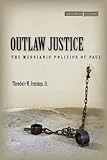Outlaw justice : the Messianic politics of Paul / Theodore W. Jennings, Jr.
Material type: TextSeries: Cultural memory in the presentPublication details: Stanford, Calif. : Stanford University Press, ©2013.Description: 1 online resource (viii, 240 pages)Content type:
TextSeries: Cultural memory in the presentPublication details: Stanford, Calif. : Stanford University Press, ©2013.Description: 1 online resource (viii, 240 pages)Content type: - 9780804785990
- 0804785996
- 0804785163
- 9780804785167
- 0804785171
- 9780804785174
- Paul, the Apostle, Saint -- Political and social views
- Bible. Romans -- Philosophy
- Paul, the Apostle, Saint
- Bible. Romans
- Paulus Apostel, approximately 1. Jh. Römerbrief
- Justice (Philosophy)
- Justice -- Biblical teaching
- Justice (Philosophie)
- RELIGION -- Biblical Studies -- New Testament
- RELIGION -- Biblical Studies -- Paul's Letters
- Justice -- Biblical teaching
- Justice (Philosophy)
- Philosophy
- Political and social views
- Exegese
- Gerechtigkeit
- Politisches Denken
- 227/.106 23
- BS2665.6.J8 J456 2013eb
- online - EBSCO
| Item type | Current library | Call number | URL | Status | Notes | Barcode | |
|---|---|---|---|---|---|---|---|
 eBook
eBook
|
Biblioteca "Angelicum" Pont. Univ. S.Tommaso d'Aquino Nuvola online | online - EBSCO (Browse shelf(Opens below)) | Online access | Not for loan (Accesso limitato) | Accesso per gli utenti autorizzati / Access for authorized users | (ebsco)713475 |
Browsing Biblioteca "Angelicum" Pont. Univ. S.Tommaso d'Aquino shelves, Shelving location: Nuvola online Close shelf browser (Hides shelf browser)

|

|

|

|

|

|

|
||
| online - EBSCO Out of control : confrontations between Spinoza and Levinas / | online - EBSCO Out of due time : Wilfrid Ward and the Dublin review / | online - EBSCO Out-heroding Herod : Josephus, rhetoric, and the Herod narratives / | online - EBSCO Outlaw justice : the Messianic politics of Paul / | online - EBSCO Outlawed pigs : law, religion, and culture in Israel / | online - EBSCO Outside-in : theological reflection on life / | online - EBSCO Overcoming America / America overcoming : can we survive modernity? / |
Includes bibliographical references and index.
Introduction: Getting ready to read Romans -- First part of Romans -- First phase: The unjust social order (1:18-3:20) -- Second phase: The coming of messianic justice (3:21-5:21) -- Third phase A: Before and after (6:1-7:6) -- Third phase B: The great transition (7:7-8:39) -- Fourth phase: Divine promise and improvisation (9:1-11:36) -- Fifth phase: The corporate improvisation of justice in the now-time (12:1-15:13).
This book offers a close reading of Romans that treats Paul as a radical political thinker by showing the relationship between Paul's perspective and that of secular political theorists. Turning to both ancient political philosophers (Plato, Aristotle, and Cicero) and contemporary post-Marxists (Agamben, Badiou, Derrida, and Žižek), Jennings presents Romans as a sustained argument for a new sort of political thinking concerned with the possibility and constitution of just socialities. Reading Romans as an essay on messianic politics in conversation with ancient and postmodern political theory challenges the stereotype of Paul as a reactionary theologian who "invented" Christianity and demonstrates his importance for all, regardless of religious affiliation or academic guild, who dream and work for a society based on respect, rather than domination, division, and death. In the current context of unjust global empires constituted by avarice, arrogance, and violence, Jennings finds in Paul a stunning vision for creating just societies outside the law. -- Provided by publisher.


